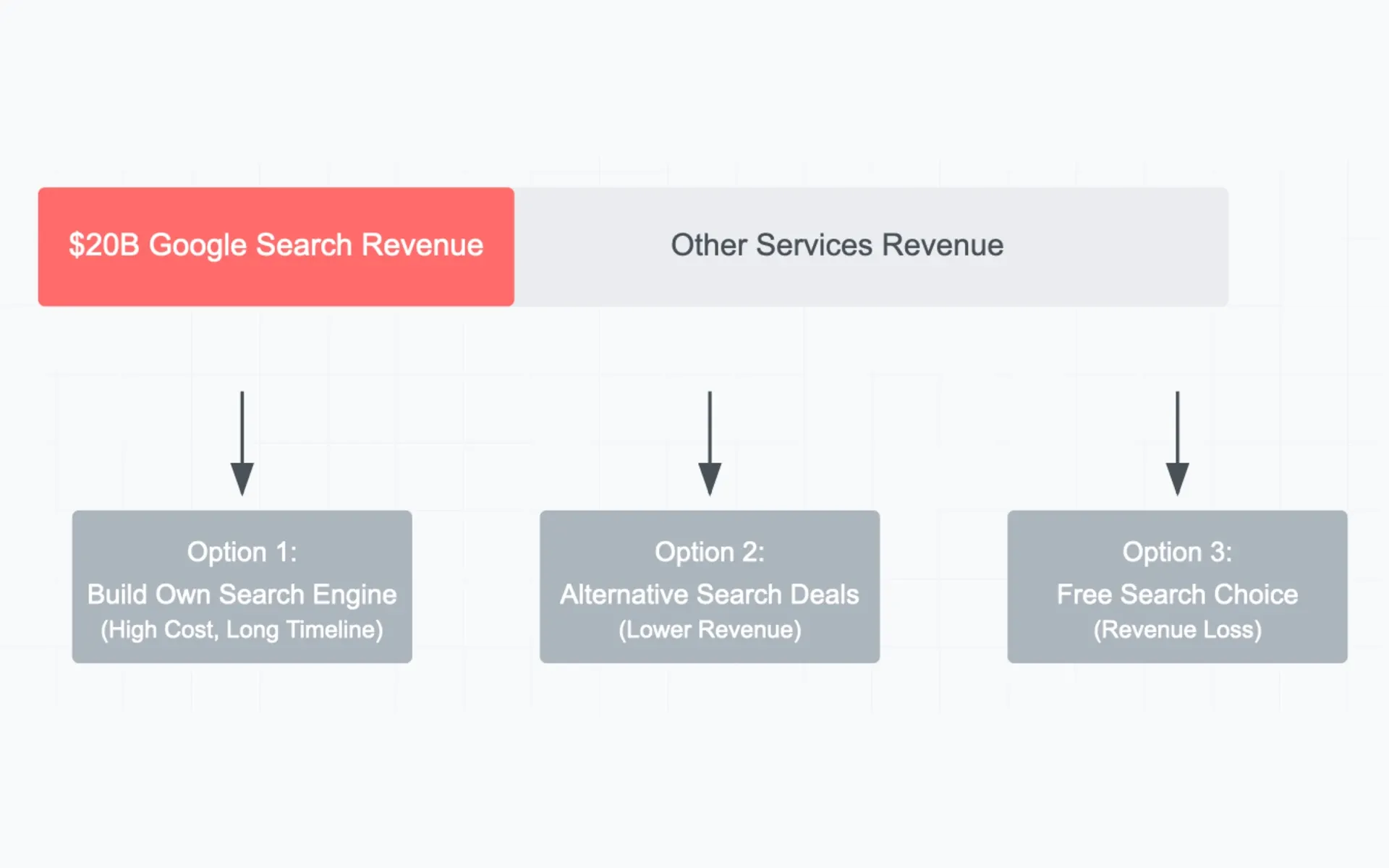Apple fights to protect $20 billion search deal in watershed Google antitrust case
Tech giant's unprecedented intervention reveals complex dynamics of search market and future of AI as ruling threatens industry-defining partnership.

In a move that underscores the far-reaching implications of the Google antitrust case, Apple Inc. has taken the extraordinary step of seeking to intervene in one of the most significant technology lawsuits of the decade. The December 23, 2024 court filing not only reveals the massive financial stakes at play—an estimated $20 billion annual revenue stream—but also illuminates the complex web of relationships that define modern internet search and raises fundamental questions about the future of artificial intelligence in digital services.
The scale of the financial relationship between Apple and Google, previously shrouded in corporate secrecy, has emerged as a central element of the case. The $20 billion annual payment from Google to Apple represents one of the largest commercial agreements in the technology sector, demonstrating the extraordinary value both companies place on default search positioning.
These payments, which account for a significant portion of Apple's services revenue, come from Google's advertising earnings generated through searches conducted on Apple devices. The arrangement has proven mutually beneficial: Google maintains its dominant market position, while Apple receives substantial compensation without having to develop its own search infrastructure.
However, the Department of Justice's proposed remedies threaten to dismantle this longstanding partnership. The November 20, 2024 proposed final judgment would explicitly prohibit Google from providing "anything of value to Apple" that might discourage Apple's entry into the search market. This provision has forced Apple to publicly acknowledge its strategic decision-making regarding search technology for the first time.
Apple's court filing provides unprecedented insight into its strategic thinking about search technology. The company outlines several compelling reasons for not developing its own search engine:
Resource Allocation and Business Priority
Apple emphasizes its commitment to other strategic initiatives, suggesting that entering the search market would divert resources from more promising opportunities. This revelation offers a rare glimpse into Apple's internal decision-making processes regarding market expansion.
Infrastructure and Investment Requirements
The filing details the massive infrastructure requirements for building a competitive search engine, including:
- Thousands of new employees with specialized expertise
- Billions of dollars in capital investment
- Years of development time before achieving market viability
- Extensive data center infrastructure
- Sophisticated algorithms and machine learning systems
Artificial Intelligence and Market Evolution
Perhaps most significantly, Apple points to the rapidly evolving AI landscape as a critical factor in its decision-making. The company argues that traditional search engine architecture may become obsolete as AI technologies advance, making massive investments in current search technology potentially obsolete before they can generate returns.
The intervention has brought to light fundamental tensions between privacy principles and search engine economics. Apple's privacy-focused business model presents significant challenges to developing a profitable search engine, which typically relies heavily on user data collection for advertising purposes.
This dilemma highlights broader industry challenges:
- The conflict between user privacy and advertising-based revenue models
- The difficulty of monetizing search services while maintaining strict privacy standards
- The potential need for new business models in digital services that better align with privacy concerns
Apple's intervention reveals several potential futures for internet search:
Market Evolution
The case could fundamentally reshape how users access search services across all platforms, not just Apple devices. The outcome might influence:
- How search engines compete for user attention
- The role of default settings in technology products
- The relationship between hardware manufacturers and service providers
AI Integration
Apple's emphasis on AI's potential to revolutionize search suggests significant changes ahead:
- Traditional search engines might be replaced by AI-driven interfaces
- The value of historical search data might diminish as AI capabilities advance
- New forms of information discovery could emerge
Competition and Innovation
The case's resolution could affect:
- The pace of innovation in search technology
- The ability of new competitors to enter the market
- The balance between competition and cooperation in the tech sector
The intervention raises novel legal questions about the intersection of antitrust law and technological innovation. Apple's participation could influence:
- How courts evaluate technological markets and competition
- The role of hardware manufacturers in software service markets
- The balance between consumer choice and platform integration
- Future regulatory approaches to technology partnerships
As the case proceeds under Judge Amit P. Mehta's supervision, the technology industry watches closely. The outcome could establish precedents affecting not just search technology, but the entire ecosystem of digital services and partnerships. Apple's intervention underscores the complexity of modern technology markets and the challenges regulators face in promoting competition while preserving innovation and consumer benefits.
The resolution of this case may define the future of internet search, digital advertising, and the relationship between hardware manufacturers and service providers for years to come. As artificial intelligence continues to evolve, the court's decisions could shape how next-generation technologies are developed, deployed, and monetized across the digital landscape.

